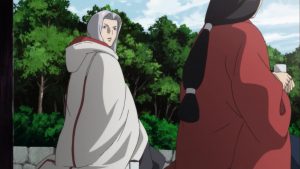 In Seirei no Moribito’s seemingly endless stockpile of strong characters, Shuga has been a relatively minor presence through the first eight episodes. That changes here, though, as he takes center stage as the narrative mostly shifts inside the palace. Along the way we also get our most extensive look at Sagum, Chagum’s older brother, and his tutor Nagai.
In Seirei no Moribito’s seemingly endless stockpile of strong characters, Shuga has been a relatively minor presence through the first eight episodes. That changes here, though, as he takes center stage as the narrative mostly shifts inside the palace. Along the way we also get our most extensive look at Sagum, Chagum’s older brother, and his tutor Nagai.
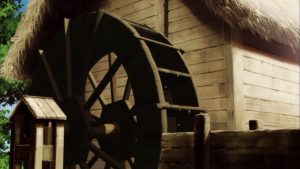 We’re still in the realm of original material here, as very little of what goes down in this ep is part of the novel. It’s all about making these characters more real and nuanced, and giving the premise more context – and it’s this distinction that makes the anime a more compelling experience in my opinion. We’re also still in the realm of “nothing happened” complaints during the series’ original run, to which all I can say is, if you think nothing happened you weren’t paying attention.
We’re still in the realm of original material here, as very little of what goes down in this ep is part of the novel. It’s all about making these characters more real and nuanced, and giving the premise more context – and it’s this distinction that makes the anime a more compelling experience in my opinion. We’re also still in the realm of “nothing happened” complaints during the series’ original run, to which all I can say is, if you think nothing happened you weren’t paying attention.
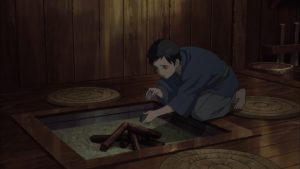 As far as the principals are concerned, the main focus here is on Chagum’s first extended interaction with peasant children. His new home is a mill, after all, and as it turns out the locals avail themselves of its services. As Balsa takes care of the grinding she literally pushes Chagum to socialize with the local kids, despite his professing to have no interest in such things. Meanwhile at the palace, the Mikado has declared that all of Chagum’s possessions be burned as a way to ensure the demise of the water demon. Prince Sagum volunteers to take responsibility for this duty himself, so as to see it done far from prying eyes (which lead to gossiping tongues).
As far as the principals are concerned, the main focus here is on Chagum’s first extended interaction with peasant children. His new home is a mill, after all, and as it turns out the locals avail themselves of its services. As Balsa takes care of the grinding she literally pushes Chagum to socialize with the local kids, despite his professing to have no interest in such things. Meanwhile at the palace, the Mikado has declared that all of Chagum’s possessions be burned as a way to ensure the demise of the water demon. Prince Sagum volunteers to take responsibility for this duty himself, so as to see it done far from prying eyes (which lead to gossiping tongues).
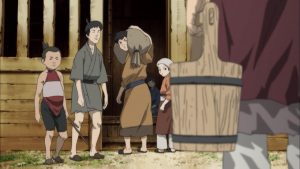 As usual, we’re left to piece the picture together from what we see and hear rather than have everything spelled out for us. But it’s a vivid picture just the same. Sagum (who was almost non-existent as a character in the novel) is obviously a bright and thoughtful young man, and very much in his father’s favor. But he’s also fragile, which is a source of great worry for the Mikado. As for Shuga, he comes off as something of a wunderkind, and his downfall (with Chagum’s “death”) has sparked no little glee among jealous rivals at the Star Palace.
As usual, we’re left to piece the picture together from what we see and hear rather than have everything spelled out for us. But it’s a vivid picture just the same. Sagum (who was almost non-existent as a character in the novel) is obviously a bright and thoughtful young man, and very much in his father’s favor. But he’s also fragile, which is a source of great worry for the Mikado. As for Shuga, he comes off as something of a wunderkind, and his downfall (with Chagum’s “death”) has sparked no little glee among jealous rivals at the Star Palace.
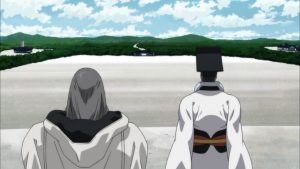 The conversation between Shuga and Sagum (which comes after an altercation between Shuga and Nagai over Chagum’s belongings) is revealing about both youths in so many ways – and not only them. Sagum’s love for his brother is clear, though his observation that he wished he could have seen the boy as Mikado is ominous. The story of the Nahji which he and Chagum unwittingly injured is so telling – of Chagum’s compassion, of the Mikado’s overprotectiveness towards his heir, and of Shuga’s tendency to speak his mind indelicately, regardless of the audience. What he says – that learning to care for something weak and defenseless is sure to instil qualities in the boys that will serve them well – betrays a wisdom beyond Shuga’s years. But the fact that it got him promoted also tells us that the Mikado is a savvy man, capable of suppressing his ego and recognizing diamonds in the rough.
The conversation between Shuga and Sagum (which comes after an altercation between Shuga and Nagai over Chagum’s belongings) is revealing about both youths in so many ways – and not only them. Sagum’s love for his brother is clear, though his observation that he wished he could have seen the boy as Mikado is ominous. The story of the Nahji which he and Chagum unwittingly injured is so telling – of Chagum’s compassion, of the Mikado’s overprotectiveness towards his heir, and of Shuga’s tendency to speak his mind indelicately, regardless of the audience. What he says – that learning to care for something weak and defenseless is sure to instil qualities in the boys that will serve them well – betrays a wisdom beyond Shuga’s years. But the fact that it got him promoted also tells us that the Mikado is a savvy man, capable of suppressing his ego and recognizing diamonds in the rough.
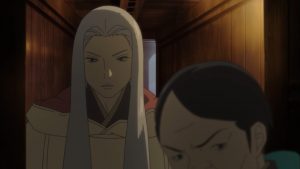 Chagum has lost none of his sense of compassion, as we know. His attempts to ingratiate himself with the locals don’t go over too well, as they’re none too impressed with his taxonomical knowledge. But when he speaks up to stop them from catching the jumping frogs as they hunt dragonflies, they do give in – because the ringleader decides it’s not longer any fun now that he’s been made to feel guilty about it. Meanwhile Balsa and Tanda have a bemused conversation about child-rearing – and while I don’t know that I necessarily agree with the conclusion they come to, it’s so refreshingly different from anything I’d seen in anime that I loved every second of it and remembered every word to this day.
Chagum has lost none of his sense of compassion, as we know. His attempts to ingratiate himself with the locals don’t go over too well, as they’re none too impressed with his taxonomical knowledge. But when he speaks up to stop them from catching the jumping frogs as they hunt dragonflies, they do give in – because the ringleader decides it’s not longer any fun now that he’s been made to feel guilty about it. Meanwhile Balsa and Tanda have a bemused conversation about child-rearing – and while I don’t know that I necessarily agree with the conclusion they come to, it’s so refreshingly different from anything I’d seen in anime that I loved every second of it and remembered every word to this day.
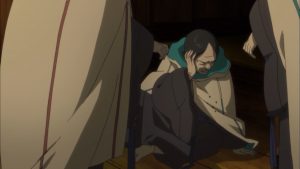 Finally, there’s a chance riverside meeting between Shuga and Tanda. Two scientists, in effect – and again, there’s so much subtlety and undertone in this meeting that it’s utterly fascinating. Shuga initially dismisses Tanda as a bumpkin (you can just tell), and is seemingly about to scold him not to touch his tools (which Tanda is enjoying in endearingly childlike fashion). But when their conversation turns to drought, Shuga recognizes that this is an intelligent and learned man – more learned than he when it comes to such matters, in fact. Tanda’s guard goes up eventually – he loved the chance to talk shop but senses the danger (and the connection to Chagum). As for Shuga, I don’t think it’s my imagination that he’s not totally disappointed that the signs still point to a coming drought…
Finally, there’s a chance riverside meeting between Shuga and Tanda. Two scientists, in effect – and again, there’s so much subtlety and undertone in this meeting that it’s utterly fascinating. Shuga initially dismisses Tanda as a bumpkin (you can just tell), and is seemingly about to scold him not to touch his tools (which Tanda is enjoying in endearingly childlike fashion). But when their conversation turns to drought, Shuga recognizes that this is an intelligent and learned man – more learned than he when it comes to such matters, in fact. Tanda’s guard goes up eventually – he loved the chance to talk shop but senses the danger (and the connection to Chagum). As for Shuga, I don’t think it’s my imagination that he’s not totally disappointed that the signs still point to a coming drought…


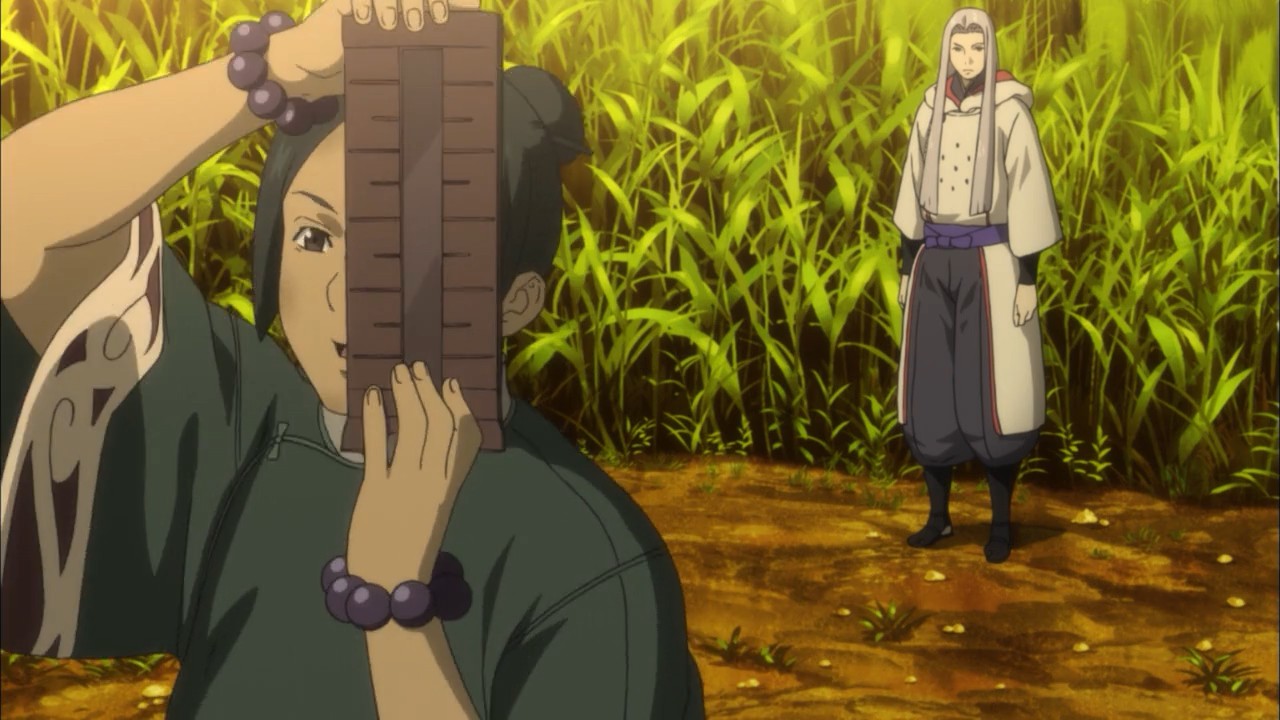
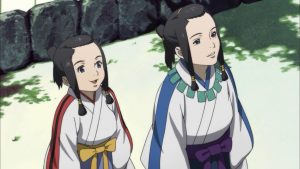
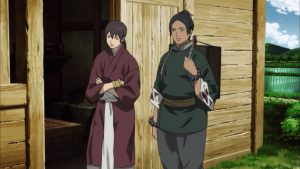
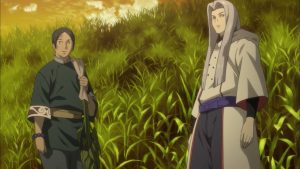
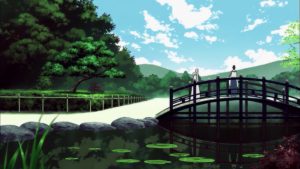
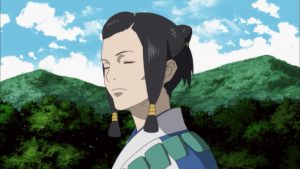
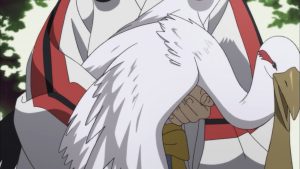
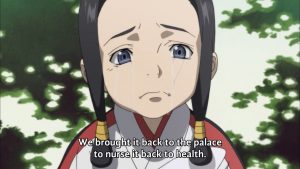
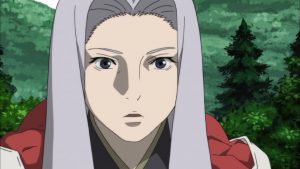
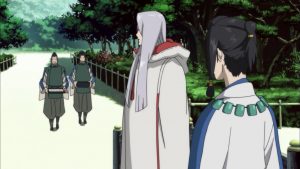
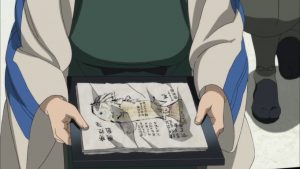
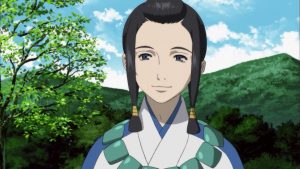
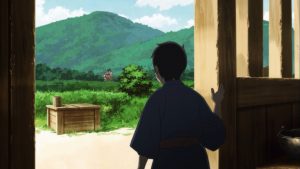
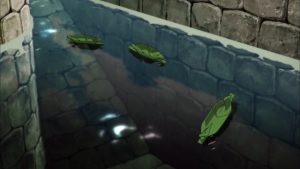
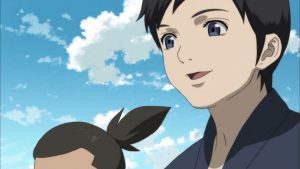
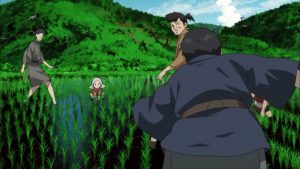
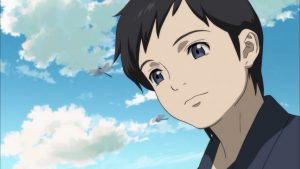
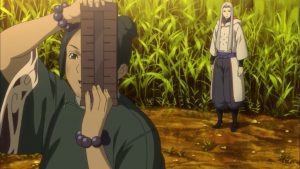
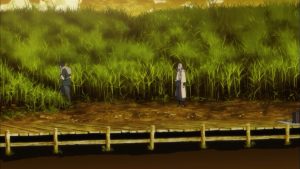
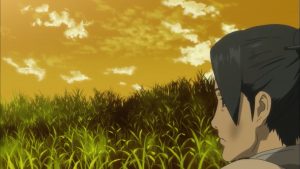
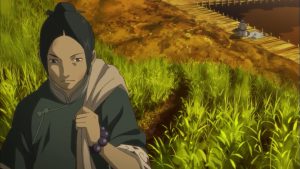
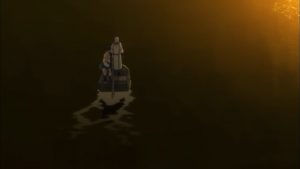
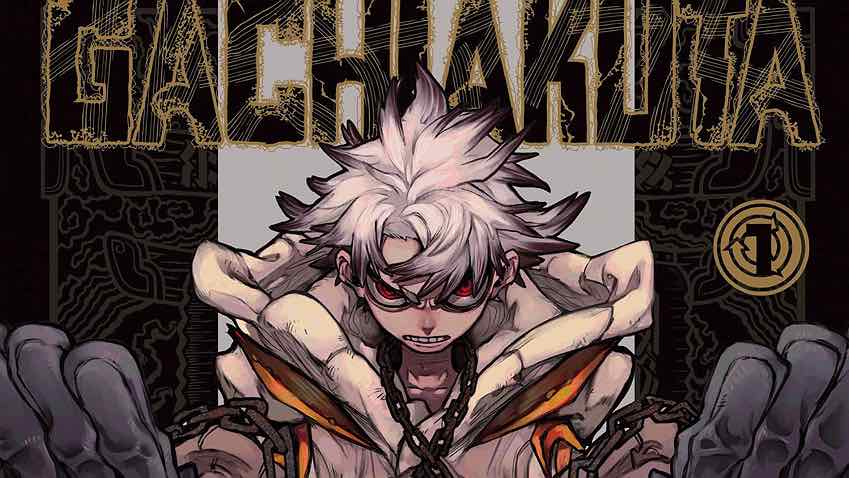
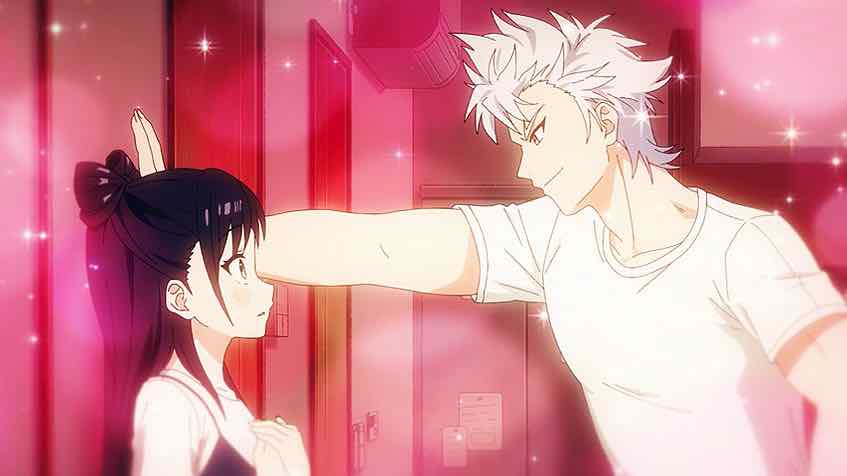
Panino Manino
May 27, 2020 at 4:07 amYes, for now I believe that Shuga is happy that the drought is still coming. What matter to him now is know if Chagum is still alive. Worries about catastrophe for the kingdom can come later and I don’t remember well how things got to that point anymore…
The meeting with Tanda as a good contrast. Shuga had already thought that they needed to stop looking only to the starts above to find what was really happening, and now Tanda showed him one sign that he wanted to find hiding in the ground.
Every week you keep remembering how people complained that “nothing happened” in Serei, and now this is making me think about Yesterday. It’s not to the same degree but a good amount of people are complaining that noting is happening and the characters are not growing.